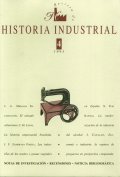Economía e industria: la ruptura de posguerra en perspectiva comparada
DOI:
https://doi.org/10.1344/rhi.v0i4.18221Resum
This article analyzes the performance of the Spanish economy during the reconstruction period (1939-58) within a long-term comparative framework. Whereas the nineteenth-century concluded with the failure of the industrial revolution in Spain, a new drive in the development process took place during the three decades previous to 1936. The new spurt towards industrialization was aborted by the pattern of reconstruction followed after the Civil War. The Francoist policy-choices were strongly connected to the German and Italian totalitarian attempts of centralizing the economic system, disciplining labour and preparing war. They radically altered the pre-1936 structure of economic incentives, leading to the most unsuccessful path of recovery in Western Europe. Moreover, the speculative tendencies within the Spanish capitalism were strengthened, meanwhile long-term innovation in the productive processes was discouraged.
Descàrregues
Descàrregues
Com citar
Número
Secció
Llicència
The author assigns all rights to the publisher. Creative Commons
The author who publishes in this journal agrees to the following terms:
- The author assigns all intellectual property rights exclusively to the publisher for the entire duration of the applicable intellectual property rights.
- The publisher will distribute the texts under the Creative Commons Attribution License, which allows others to share the work, provided that they acknowledge the authorship, its initial publication in this journal, and the conditions of the license.





